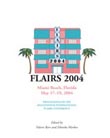Published:
May 2004
Proceedings:
Proceedings of the Seventeenth International Florida Artificial Intelligence Research Society Conference (FLAIRS 2004)
Volume
Issue:
Proceedings of the Seventeenth International Florida Artificial Intelligence Research Society Conference (FLAIRS 2004)
Track:
All Papers
Downloads:
Abstract:
Many classification systems rely on clustering techniques in which a collection of training examples is provided as an input, and a number of clusters c1,...cm modeling some concept C results as an output, such that every cluster ci is labeled as positive or negative. In such a setting clusters can overlap, and a new unlabeled instance can be assigned to more than one cluster with conflicting labels. In the literature, such a case is usually solved non-deterministically by making a random choice. This paper introduces a novel, hybrid approach to solve the above problem by combining a neural network N along with a background theory T specified in defeasible logic programming (DeLP) which models preference criteria for performing clustering.

FLAIRS
Proceedings of the Seventeenth International Florida Artificial Intelligence Research Society Conference (FLAIRS 2004)
ISBN 978-1-57735-201-3
Published by The AAAI Press, Menlo Park, California.
